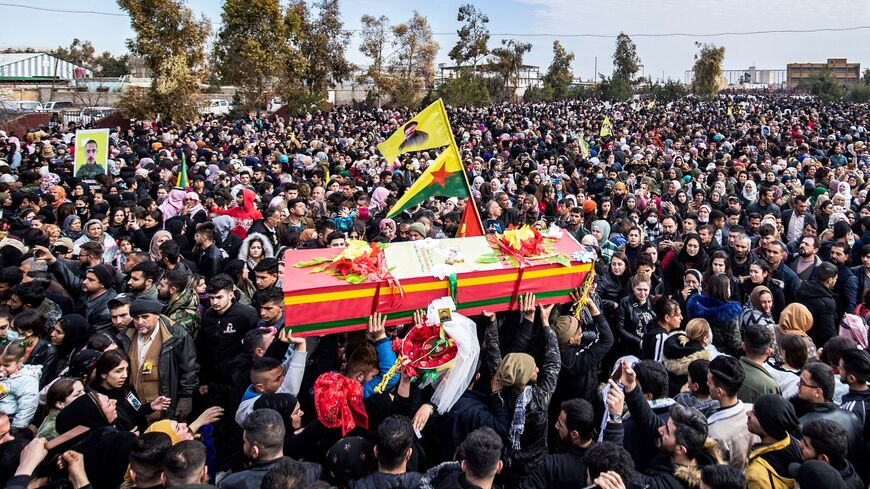
Regional alignments solidify after the invasion of Ukraine, as Iraqi politicians call for peace while four-way collaboration on dealing with the Islamic State and border security continues with Russia, Iran and Syria.
Hours after the news broke that Russia had begun an invasion of Ukraine at dawn on Feb, 24, Iraq’s national security advisor took part in a meeting of a four-nation joint intelligence center that Western nations have long eyed warily.
The center on Thursday officially discussed Iraq’s concerns following a prison break in neighboring Syria that freed hundreds of alleged Islamic State (IS) leaders and fighters, many of them Iraqi nationals.
The Baghdad center, officially referred to as the Quartet Information Exchange and Coordination Center, comprises representatives from Russia, Iran, Syria and Iraq to coordinate intelligence against IS in the region.
National Security Advisor Qasim al-Araji stressed during the meeting that Iraq fears “there is a plot for the return of terrorists and their spread in the region, which will generate a state of instability.”
Photographs were circulated after the meeting of Araji standing in front of Iranian and Russian flags next to men in military uniform.
Araji lived for many years in Iran, received training from Iran’s Islamic Revolutionary Guards Corps (IRGC), and reportedly fought on the side of Iran during the Iran-Iraq war in the 1980s. He returned to Iraq after 2003 but was later imprisoned by US forces for almost two years on suspicion of smuggling and distributing explosives used to target US forces. He was interior minister of Iraq from early 2017 until late 2018 and is current National Security Advisor.
In the conflict that has just begun, the EU and the US clearly support Ukraine, though thus far mostly with statements and sanctions. Thousands of US troops have been sent to Poland, Germany and Romania.
However, Syria, Iran and China instead back Russia.
Many Iraqi positions on the invasion have thus far been mild, with calls for the UN and “the international community” to take action.
The head of the Hikma Movement, Ammar Hakim, wrote on Thursday that the conflict between Russia and Ukraine “heralds a major global crisis that is difficult to contain.” He called on the international community, the United Nations and the Security Council to take urgent steps to encourage negotiations.
Russia holds a permanent position at the UN Security Council and veto power, which some claim it should be stripped of.
The popular Iraqi cleric Muqtada al-Sadr, whose political alliance got the most support in the October 2021 elections, wrote on Twitter before the start of the Russian operation: “I am still looking forward to the principle of dialogue prevailing between the two Christian neighboring countries” and that war is “absolutely useless.”
Though Sadr maintains his contacts with Iran, his movement is seen as more of a nationalist one compared to many other Shiite political factions with armed wings, which have long been supported by IRGC training, weapons, and funding and are known as the “muqawama” or resistance factions.
These political parties fared relatively poorly in the October elections, however. A party under the IRGC-linked Kataib Hezbollah armed faction, which has government-salaried brigades in the Popular Mobilization Units, only got one seat out of 329 in the parliamentary assembly.
A government has not yet been formed in Iraq almost five months after the vote.
Sadr has also long been against Iraqi IRGC factions crossing into Syria and fighting on the side of the Syrian government, where Russia also played a major role on the side of the Bashar al-Assad government.
The Baghdad Quartet center was announced in late September 2015, only days before Russia officially entered the Syrian conflict.
It had been established after Iranian general Qassem Soleimani visited Russia some months before, who had “served as Iran’s main point of contact with the Russians for military operations in Syria until his assassination in January 2020,” according to the Center for Strategic and International Studies (CSIS).
Soleimani and Iraqi militia commander Abu Mahdi al-Muhandis were killed by a Jan. 3, 2020 US drone attack as they were leaving the Baghdad airport. Russia in 2020 reportedly awarded a medal to Muhandis for “strengthening military cooperation.”
In northeastern Syria, the US-backed, Kurdish-led Syrian Democratic Forces in territorial control of the area have long engaged in talks with Russia and are widely seen as drawing closer to the country in recent months.
The SDF were in control of the prison housing thousands of IS detainees that was attacked in late January.
One source from eastern Syria told Al-Monitor in November 2021, shortly after a plan to attack the same prison was thwarted, that: “some Russian nationals who had been in SDF-run detention facilities in northeastern Syria for allegedly being IS fighters had recently been moved to Damascus ‘to ensure that they do not escape’, presumably after negotiations with the Syrian government.”
Though IRGC-linked factions are officially on the opposite side of the SDF, fighting between the two is rare. IRGC-linked factions have, however, often used territory officially under the Syrian central government to target bases in SDF territory housing US forces.
A barrage of rockets that in early January hit the Conoco and Green Village military facilities in eastern Syria’s Arab-majority Deir al-Zor province, for example, were attributed to these IRGC-linked groups.
